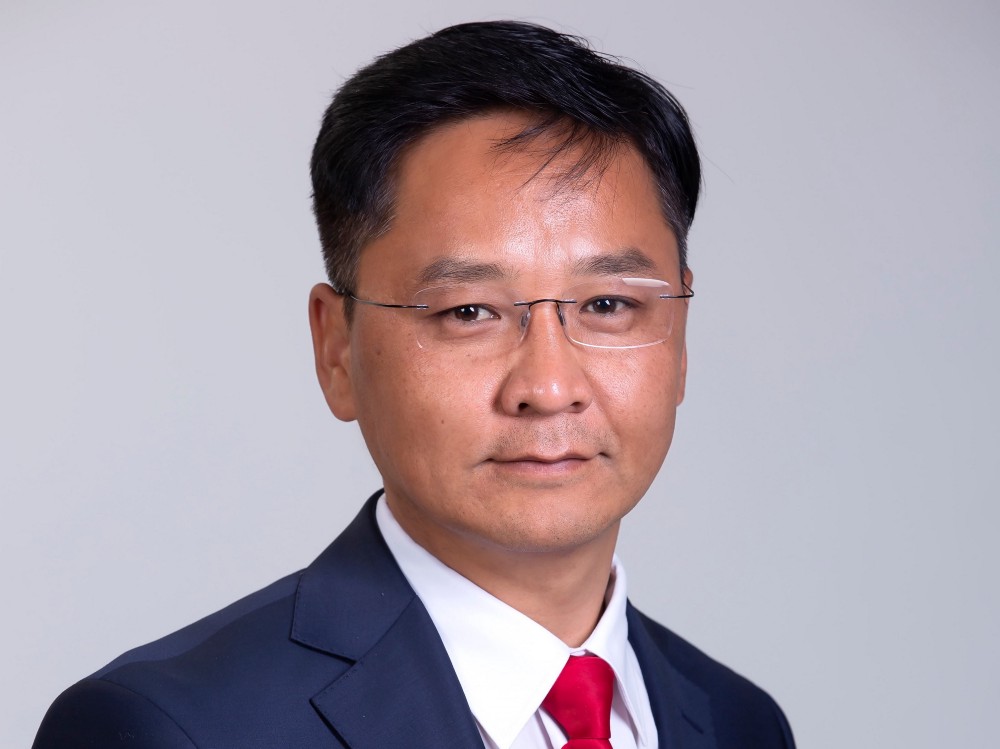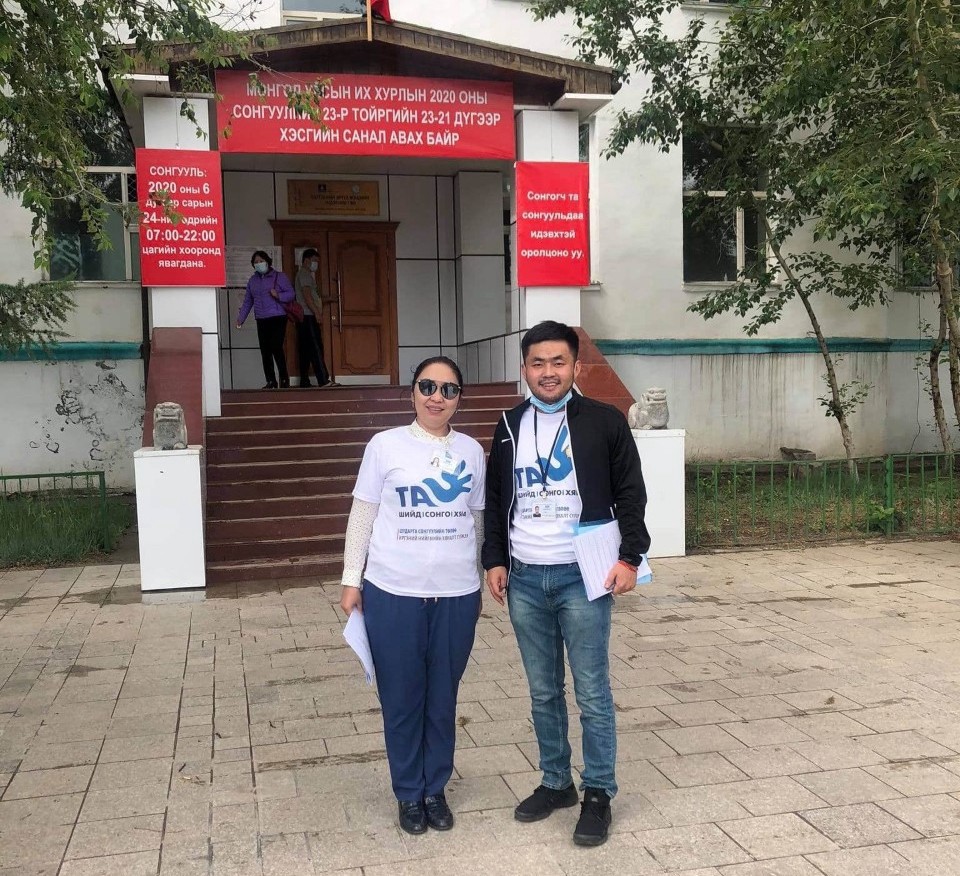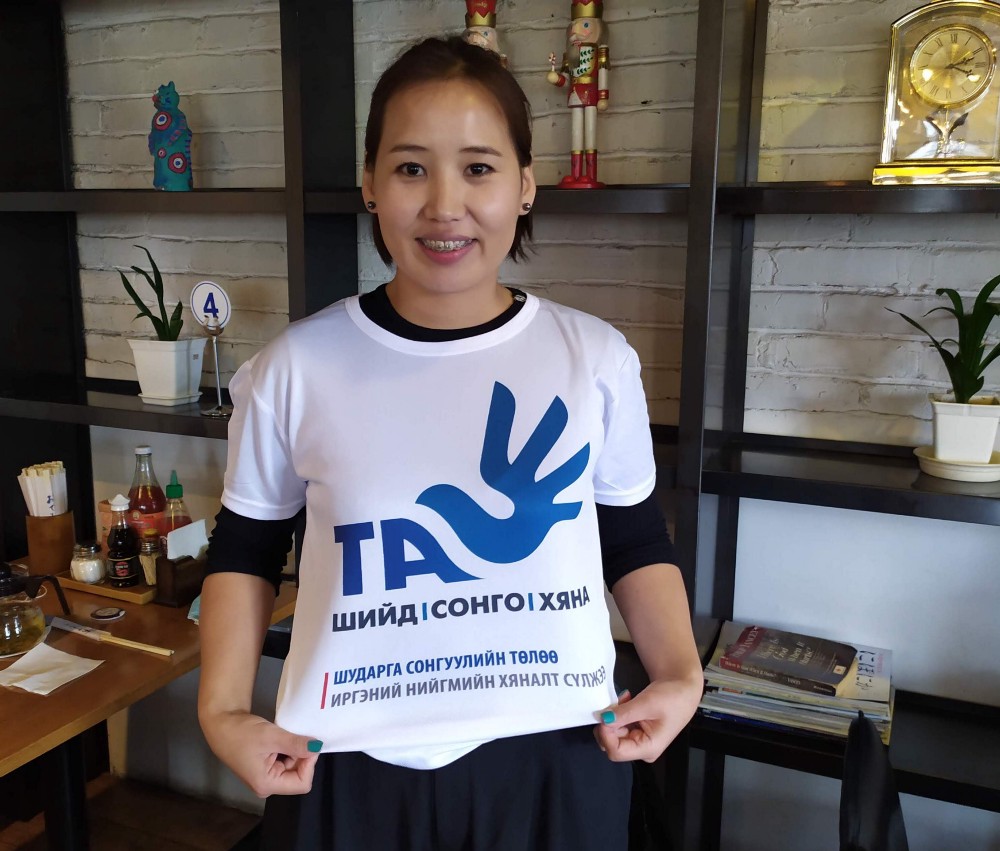-
What We Do
- WHERE WE WORK
-
About Us
 Welcome Message from Carol Jenkins
Welcome Message from Carol JenkinsFor more than 90 years, World Learning has equipped individuals and institutions to address the world’s most pressing problems. We believe that, working together with our partners, we can change this world for the better.
On my travels, I’ve had the opportunity to meet with many of those who have joined us in this mission. In Baghdad, we’ve trained more than 2,300 Iraqi youth who are already giving back at home. In London, our partners in the TAAP Initiative strongly believe that we are all responsible to practice inclusion. And in Vermont, our Experiment in International Living and School for International Training participants prove every day that they have the tools and the determination to change the world.
Please join us in our pursuit of a more peaceful and just world.
- Get Involved
Media Center > Story
How LEAD Mongolia Alumni Helped Support Free and Fair National Elections This Summer
October 8, 2020

By Meghan Burland, Chief of Party, Leaders Advancing Democracy (LEAD) Mongolia
Free and fair elections are often considered a hallmark of democracy. Mongolia was no exception to this on June 24, 2020, when 73 percent of registered voters turned out to vote for the 76 members of the State Great Khural, Mongolia’s unicameral parliament, demonstrating their steadfast commitment to citizen participation in spite of COVID-19 social distancing restrictions and severe weather across the country.
Youth played a significant role in the election, with youth voter turnout at 62 percent for voters aged 18 to 25, an increase from the 2016 youth voter turnout of 50.8 percent. This year’s election also featured an unprecedented number of young candidates running for office as well as youth-led nonpartisan citizen election monitoring efforts.
Alumni from World Learning’s Leaders Advancing Democracy (LEAD) Mongolia program were front and center in election-related activities across the country. As Mongolia prepares for local elections in October 2020, as well as a presidential election next year, LEAD Mongolia and its alumni continue to prioritize increasing young Mongolians’ civic participation and highlighting the work of youth in the country.
LEAD Mongolia is a five-year leadership development program — funded by the U.S. Agency for International Development (USAID) and implemented by World Learning — that brings together young professionals representing different sectors and experiences to take part in civic advocacy and leadership training, exchanges, and community action planning, all aimed at fostering a strong network of young democracy advocates across the country.
Below, four LEAD Mongolia Fellows share their experiences of participating in this year’s important parliamentary election and how their LEAD Mongolia training helped to prepare them.
Erdenetugs Oroolon

LEAD 2019 In-Country Program Fellow Erdenetugs Oroolon, an elementary school teacher, ran for a parliamentary seat as a candidate from the New Party under the New Coalition in the 6th District, which comprises Dundgovi and Govisumber aimags (provinces). Erdenetugs decided to run in February 2020, after changes to the electoral law increased the number of seats in his district from one to two, creating new opportunities for first-time and independent candidates. The December 2019 amendments returned Mongolia to a multi-member plurality system.
“As a young professional, I thought I could use this election period as an opportunity to engage with the public and create [a] base of supporters,” says Erdenetugs.
However, he notes, this year’s election was not without its challenges, including the constraints of Mongolia’s traditional two-party system, allegations of vote-buying, a need for strengthened voter education and awareness, and COVID-19 restrictions. Due to the pandemic, candidates were not able to engage in traditional voter outreach during the three-week campaign period, making it difficult for newer parties and first-time, lesser-known candidates to gain the necessary support to win a seat. Erdenetugs also highlighted local difficulties, such as a drought in Dundgovi aimag, that required many herders to migrate to more remote areas for better land, making it more difficult to reach these voters ahead of Election Day.
Erdenetugs focused his policy platform on three major issues: decreasing allegiance to the two-party system and creating room for new, independent candidates; implementing equal distribution of wealth in compliance with citizens’ constitutional rights; and creating a corruption-free society. Although he did not win a seat, Erdenetugs had a fulfilling experience, having learned more about his own strengths and weaknesses, as well as gaining new perspectives from his fellow citizens on how to improve governance systems. He plans to run again in the next election.
On how his LEAD Mongolia experience helped prepare him for his parliamentary run, Erdenetugs explains he leveraged the civic action planning and grassroots-level advocacy skills learned during his time with the program to better connect with voters. Most importantly, his LEAD experience provided him with the power to “shift [my] perspective and challenge myself.”
Delgerzul Lodoisamba and Orgil Dugersuren

LEAD 2016 U.S. Exchange Program Fellow Delgerzul Lodoisamba and 2019 U.S. Exchange Program Fellow Orgil Dugersuren participated in domestic election observation efforts, organized by local civil society organizations Women for Change, Youth Policy Watch, and the CSO Network for Fair and Just Elections. Prior to this year, both had observed elections through the Organization for Security and Cooperation in Europe’s Office for Democratic Institutions and Human Rights (OSCE/ODIHR) election observation missions, including for the 2013 and 2017 presidential elections and 2016 parliamentary elections. However, due to the COVID-19 pandemic this year, OSCE/ODIHR was unable to deploy a mission, making local civil society observation efforts all the more important.
On June 24, civil society election observers joined observers from political parties and independent candidates at polling stations around Ulaanbaatar. Delgerzul observed during the morning shift, from 6:30 am until 3 pm, while Orgil observed from 3 pm until 1 am, after votes were counted. Both noted how well COVID-19 safety measures were implemented in order not to disrupt the election or discourage voters from showing up to the polls.
As citizens, Delgerzul and Orgil both emphasized the importance of independent election observation efforts to promote transparency and confidence in election results. It is a “great honor,” says Delgerzul, to represent citizens on Election Day and help ensure reliable and fair elections, noting how other LEAD Mongolia Fellows encouraged her to observe this year. For Orgil, he believes citizen participation exemplifies the spirit of democracy and contributes to the further strengthening of Mongolia’s democratic system. However, challenges remain in Mongolia, such as the ability of young, independent candidates to gain equal opportunities; a fluctuating legal environment surrounding elections; and a narrow 21-day window for election campaigns.
Enkhbayar Tumurbaatar

LEAD 2019 In-Country Program Fellow Enkhbayar Tumurbaatar served as an election observer for the first time, joining the election observation organized by local civil society organizations Women for Change, Youth Policy Watch, and the CSO Network for Fair and Just Elections. Of the overall experience, Enkhbayar says, “it was [a] very interesting and new experience for me to watch the entire election process, how the election law and rules were executed on the ground, the actions of the organizers and other observers that were present.”
In deciding to observe for the first time, Enkhbayar explains that she wanted to understand the electoral system from a new perspective. She adds that, as young person, she wanted to engage and have a meaningful role in the democratic process of her country.
“As a first-time observer, the most rewarding…take-away from me was the fact that I was able to witness and see the reality of the election through my own eyes, rather than hearing about it from someone else or from a media outlet,” she says. “I was humbled and happy to have contributed to the great effort CSOs are making to keep elections fair and right in Mongolia.”
From Enkhbayar’s perspective, the biggest obstacle to running for office in an election is the adversarial element of politics, such as negative campaigning that some parties or candidates may use to bring down the opposition. Running as an independent candidate requires courage, both to campaign without the support of a party and to prepare oneself for political attacks from both opponents and voters. For someone running in a specific political party, the challenge is to demonstrate your capacity to party leadership and prove that you can make substantial contributions to the party. Both of these scenarios can be particularly challenging, sometimes prohibitively, even for LEAD Mongolia alumni, who are “emerging leaders who have the capacity and genuine will to contribute effectively to the development of Mongolia.”
Enkhbayar cites her LEAD Mongolia experience in showing her the importance of civic participation in a democracy, which inspired her to participate as an election observer. Additionally, the strong LEAD alumni network involved in the elections further encouraged her to participate and to gain new knowledge on the electoral process.
. . . .
Overall, all four LEAD Fellows emphasize the importance of youth participation in strengthening Mongolia’s democratic trajectory. As Enkhbayar says, “there is a great need for programs, campaigns, and activities that help demonstrate and have youth feel the real impact and power their participation can bring. A great example of this is the LEAD Mongolia program…if I had not been to LEAD, I would not have understood the importance of my participation.”
As Mongolia prepares for local elections on October 15, Delgerzul highlights how much the younger generation cares about democracy, and how young people are using Facebook and other social media platforms to raise their voices and call for change. Moving forward, Mongolian youth will continue to play a critical role, particularly in civil society efforts to advocate for election reforms, transparency, and increased voter education. As MP candidate Erdenetugs puts it, “people need to be empowered to work hard for their dreams…and fight for the society they want to live in.”





